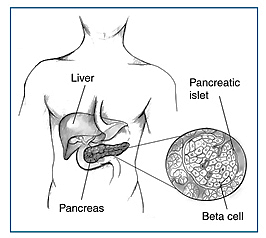A new study demonstrates that a gene therapy approach can lead to long-term survival of functional beta cells as well as normal blood glucose levels for extended periods of time in mice with type 1 diabetes. Researchers used an adeno-associated viral (AAV) vector to deliver to the mouse pancreas two proteins, Pdx1 and MafA, which reprogrammed the alpha cells into functional, insulin-producing beta cells.
Beta-cell replacement therapy is likely to fail because adding new cells will fall victim to the same autoimmunity that destroyed the original cells. The solution is to reprogram other cell types to functional beta-like cells, which can produce insulin but are distinct from beta cells and therefore are not attacked by the immune system.
Researchers Gittes and first author Xiangwei Xiao of the University of Pittsburgh School of Medicine engineered an AAV vector to deliver proteins called Pdx1 and MafA, which support beta cell maturation, proliferation, and function, to the mouse pancreas. The reason why they picked alpha cells to reprogram is because they are plentiful, resemble beta cells, and are in the correct location, all of these factors facilitate reprogramming of cells.
Comparing the gene expression patterns of normal beta cells and insulin-producing cells derived from alpha cells, the researchers confirmed that it was nearly complete cellular reprogramming. The gene therapy produced normal blood glucose levels in diabetic mice, for typically four months. Also, the therapy was able to generate functional insulin-producing cells from human alpha cells.
Unfortunately, the mice did eventually return to the diabetic state, suggesting that it would not cure the disease. But viral vectors can be delivered directly to the human pancreas through a routinely performed non-surgical endoscopic procedure; however, this procedure can elicit pancreatic inflammation. Also, the longevity of the treatment is unknown considering that some studies suggest that processes in mice are highly accelerated. Therefore, four months could translate to several years for humans according to Gittes.
Currently, researchers are testing the therapy on non-human primates. If they are able to produce intended results, researchers will begin work with the FDA to get approval for use of this viral gene therapy for diabetic, type 1 and 2, patients. This could be the breakthrough that leads to the cure for diabetes!



Leave a Reply